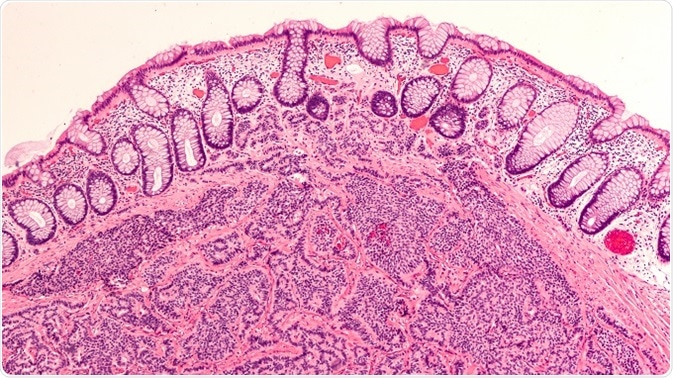A carcinoid tumor is a type of cancer that develops in different parts of the body and is characterized by a slow growth phase.

Credit: Photomicrograph of a carcinoid tumor. Credit: David Litman/Shutterstock.com
There are definite types of neuroendocrine tumors, and this tumor frequently occurs in the digestive tract, especially in the appendix, stomach, rectum, colon, and small intestine, and sometimes in lungs. The symptoms of this cancerare not visible until it reaches an advanced stage.
Carcinoid syndrome
The carcinoid tumor produces serotonin or other chemicals and delivers them into the bloodstream. This production of chemicals leads to certain signs and symptoms, which are together indicative of carcinoid syndrome. The syndrome occurs only when the carcinoid tumor is in the advanced stage, and its treatment involves addressing the carcinoid tumor.
As the advanced state of the carcinoid tumor causes the syndrome, there is no established cure available for the patients. In such cases, medications play a vital role in reducing the impact of the symptoms caused.
Symptoms of carcinoid syndrome
The symptoms that are associated with carcinoid syndrome are:
- Pain in the stomach and diarrhea: There is a frequent occurrence of abdominal cramps along with watery stools (diarrhea) in people with carcinoid syndrome. Loss of appetite can also be considered as a symptom.
- Flushing of the skin: The facial skin and the skin on the upper chest become hot and are transformed into purple color. This type of flushing might occur for few minutes or hours or might extend throughout the day. There is no proper cause for the emergence of flushing, but it has been assumed that continuous exercise, stress, and consumption of alcohol trigger the flushing process.
- Facial skin lesions: The spider-like veins appear on the upper portion of the lip and on the nose. The veins turn purple.
- Difficulty in breathing and wheezing: Breathlessness and wheezing are the common symptoms of carcinoid syndrome. These symptoms might occur along with skin flushing.
- Rapid heartbeat: Experiencing frequent sequences of rapid heartbeat could definitely be a sign of this syndrome.
The symptoms of this syndrome can arise at any time, as there is no particular time for the tumor to produce the chemical. There are chances for people to develop another rare and dangerous condition called the carcinoid crisis.
Causes of carcinoid syndrome
Only a small percentage of the tumor creates chemicals causing carcinoid syndrome. In most cases, the liver voluntarily takes the responsibility of neutralizing these chemicals and stops them from reaching other parts of the body. By this process, the liver stops the chemicals from causing carcinoid syndrome symptoms.
It is possible that the tumor, at an advanced stage, spreads the chemicals throughout the liver by itself. In this case, the liver does not have enough time to neutralize the chemicals, as they have already reached the blood stream. People who are affected by carcinoid syndrome are often found to have the chemicals spread throughout the liver.
It is not necessary that all the advanced tumors will cause the syndrome; for example, lung carcinoid syndrome produces chemicals which are initially delivered to the blood. From there, they get transmitted to the liver, and as a result, the liver gets enough time to address the issue, whereas the carcinoids in the intestine release chemicals into the blood that reach the liver directly before reaching other parts of the body. The liver then neutralizes the chemicals before they can damage other parts of the body.
Carcinoid syndrome and its complications
Patients with carcinoid syndrome are prone to develop the following complications:
Heart disease: Certain people with carcinoid syndrome are prone to develop some heart disease, as the valves of the heart get thickened and interrupt the functions of the heart. The symptoms of heart disease comprise lack of breath during some physical activity. Heart diseases that are caused by the carcinoid tumor eventually lead to failure of the heart. The physician prescribes medication or surgery to repair the valves affected by the advanced carcinoid syndrome.
Obstruction of bowel: The spreading of cancer to the lymph nodes besides the small intestine makes the intestine to shrink and kink. This type of narrowing of the intestine is known as bowel obstruction. The symptoms of obstruction of the bowel include vomiting, pain in the abdomen, and cramping. In this case, surgery is compulsory.
Carcinoid crisis: The severe form of flushing along with low blood pressure is called carcinoid crisis. Carcinoid crisis occurs only when the patients are subject to triggers such as anesthesia. Often, carcinoid crisis is known to be fatal. The physician prescribes medications to decrease the risk of the crisis.
After understanding, the patients might be relieved by knowing the cause for the signs and symptoms of carcinoid tumor. Identifying a rare condition like carcinoid syndrome can create mental stress for the patients. To increase the ability to cope with the problem, the patient has to discuss their experience with symptoms and how they feel with the physician.
Sources
- https://www.ncbi.nlm.nih.gov/pubmed/7690246
- www.carcinoid.org/…/
- www.mayoclinic.org/…/con-20027127
- http://www.cancer.net/cancer-types/carcinoid-tumor/introduction
- www.cancer.org/…/signs-symptoms.html
- www.nhs.uk/conditions/carcinoid-syndrome/Pages/Introduction.aspx
Further Reading
- All Carcinoid Tumor Content
- Causes of Carcinoid Tumors
- Carcinoid Tumor Signs and Symptoms
- Treatment Options for Carcinoid Tumors
- Diagnosing Carcinoid Tumors
Last Updated: Feb 26, 2019
Source: Read Full Article
